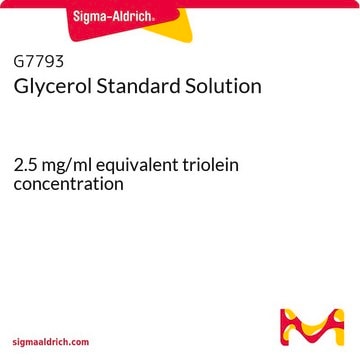77067
Glycérol
analytical standard
Synonyme(s) :
1,2,3-propanetriol, Glycérine
About This Item
Produits recommandés
Qualité
analytical standard
Niveau de qualité
Densité de vapeur
3.1 (vs air)
Pression de vapeur
<1 mmHg ( 20 °C)
Pureté
≥98.5% (GC)
Température d'inflammation spontanée
698 °F
Durée de conservation
limited shelf life, expiry date on the label
Technique(s)
HPLC: suitable
gas chromatography (GC): suitable
Impuretés
≤0.3% water
Indice de réfraction
n20/D 1.474 (lit.)
Point d'ébullition
182 °C/20 mmHg (lit.)
Pf
20 °C (lit.)
Densité
1.25 g/mL (lit.)
Application(s)
cleaning products
cosmetics
flavors and fragrances
food and beverages
personal care
Format
neat
Chaîne SMILES
OCC(O)CO
InChI
1S/C3H8O3/c4-1-3(6)2-5/h3-6H,1-2H2
Clé InChI
PEDCQBHIVMGVHV-UHFFFAOYSA-N
Vous recherchez des produits similaires ? Visite Guide de comparaison des produits
Description générale
Application
- a supplement during cell culture of Mycobacterium tuberculosis and Mycobacterium avium.
- a fuel during designing enzymatic biofuel cell.
- a liquid composite matrix with 4-HCCA and 3-aminoquinoline for analysis of neutral and acidic glycans.
- a matrix for fast atom bombardment MS.
- may be employed as liquid matrix for the quantification studies by MALDI (Matrix-assisted laser desorption/ionization mass spectrometry) analysis.
Actions biochimiques/physiologiques
Produits recommandés
Code de la classe de stockage
10 - Combustible liquids
Classe de danger pour l'eau (WGK)
WGK 1
Point d'éclair (°F)
390.2 °F - Pensky-Martens closed cup
Point d'éclair (°C)
199 °C - Pensky-Martens closed cup
Faites votre choix parmi les versions les plus récentes :
Déjà en possession de ce produit ?
Retrouvez la documentation relative aux produits que vous avez récemment achetés dans la Bibliothèque de documents.
Les clients ont également consulté
Notre équipe de scientifiques dispose d'une expérience dans tous les secteurs de la recherche, notamment en sciences de la vie, science des matériaux, synthèse chimique, chromatographie, analyse et dans de nombreux autres domaines..
Contacter notre Service technique


